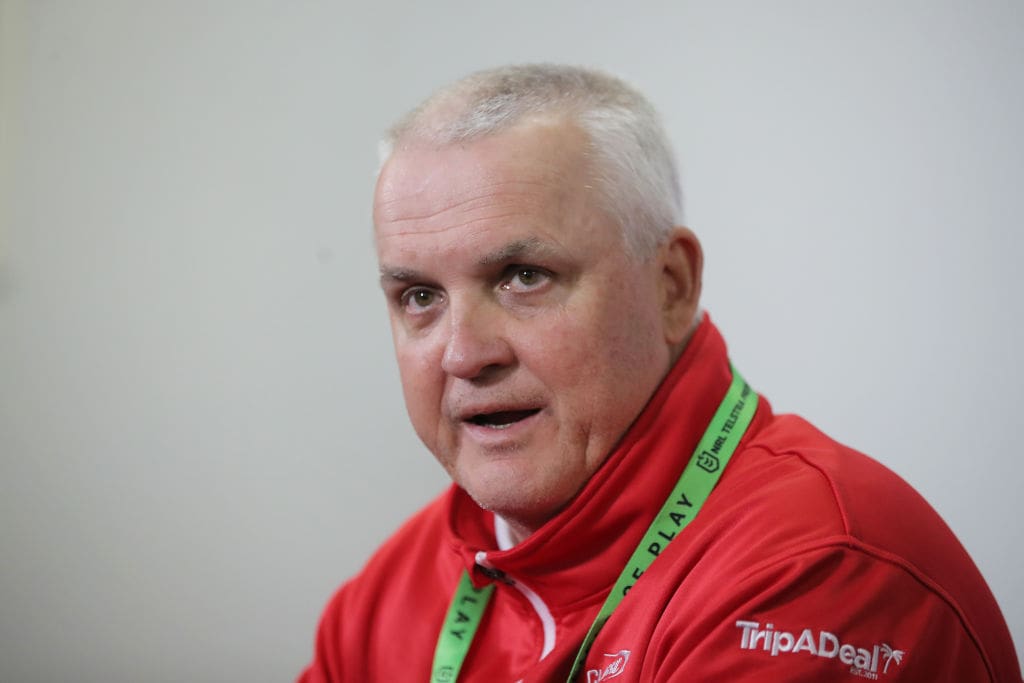FROM THE SMH
When you ask Nathan Brown if he saw a future coach in Jason Ryles when he coached the representative prop at the Dragons two decades ago, he can't help but chuckle.Not because Ryles didn't have the footv IQ to transition into coaching, but because a large part of the reason Brown lost his luscious, curly locks was guys such as Ryles.
"He just had this fiery temperament and outlook, which is so different to what he is now," Brown says. "I always knew he had the football to be able to do it, because he understood footy better than most and always asked plenty of questions. But he's a lot calmer character now than he was when I had him. He's matured a lot." If Cameron Ciraldo, largely hyped as the next best thing in coaching over the past 18 months, was the next Craig Fitzgibbon, then Ryles is the next Cameron Ciraldo. His coaching resume includes working as an assistant to Craig Bellamy at the Melbourne Storm, an education under Eddie Jones with the England rugby union team and now a stint as Trent Robinson's • right-hand man at the Roosters.
His name was always going to dominate the headlines this year, but it's come far earlier than many predicted after the Herald's revelation this week that the Dragons had recently told coach Anthony Griffin they would go to market for 2024. Ryles has told those close to him he's interested in the Dragons job. He lives in Wollongong and leaves home at 4.30am most mornings to start his day with the Roosters.
The conundrum Ryles faces - and the Dragons for that matter - is that he is also considered a frontrunner for Craig Bellamy's job at Melbourne. Any job that comes up for
Jason, he will need to see where the club is at." Brown says. "That's important for any new coach. He needs to know how is the club run and who is in key positions? Will they make your job easier? Will they make your job harder? Rookie coaches need to focus on coaching."They don't need to worry about running the club or managing the salary cap. They need the freedom to do what they were brought there to do, and that is coach. He's ready to run his own team. He's never been in a rush. That will come back to pay dividends."
Ryles is in the second year of his three-year deal with the Roosters and has a close relationship with Trent Robinson, who was the assistant to Brian Smith when
Ryles played for the club for two seasons from 2010.
It's understood Ryles' manager,
George Mimis, has indicated he won't entertain conversations with any club without the imprimatur of Robinson and Roosters supremo Nick Politis. Alex McKinnon, Boyd Cordner and David Klemmer had just been named in the inaugural NSW under-20s team.At the time, back in 2012, Ryles was still playing with the Storm.
Bellamy had just given his players the week off for representative round, with many taking the opportunity to go on a mid-season vacation. Ryles, though, at the i request of Blues under-20s coach and Storm assistant Dean Pay instead flew to Sydney to get his first taste of life on the other side of the football field. Given the trajectory of his career path since, it is safe to assume that experience was a significant moment in defining the next phase of his life.
"I doubt it," McKinnon jokingly fires back. "Honestly, we did absolutely nothing that week. We were staying at Panthers and it rained the whole week. All we did was play aqua golf and spent time at the club. We did one mini ball-work session on some basketball court." Rvles's love for coaching began in 2014 when he signed to captain-coach his junior club, Wests Illawarra. At the time he was working as a sales representative for a chemical manufacturer, juggling coaching with his new reality of an everyday job away from football.
Two years into the job, Storm general manager of football Frank Ponissi, who knew Ryles from his playing days in Melbourne, offered him an assistant coaching position.
Ryles would play a key role in helping the Storm to two premierships during that period before setting off to join
Jones and the English rugby union.
At the end of every season for the four years of his time at the Storm, Ryles would fly to Europe to work with Jones and the England team for a few weeks.
He would help the team with tackle
technique, while at the same time earning the invaluable experience that has now put him in pole position for the next position that becomes available on the NRL coaching merry-go-round
"Without criticising league, league doesn't have a contest for the ball," Jones tells the Herald of his decision to sign Ryles. «Really, all you coach is the usage of the ball and the stoppage of the ball. In rugby there are so many other contests we have.
"Because league coaches have less to concentrate on, they are much more sophisticated in the way they look at attacking running lines, attacking support lines and ways to break down defences. And, conversely, on the other side come up with systems to stop the defence.
"That's why I've always been attracted to league coaches, because their knowledge in those areas is higher than rugby coaches. Also with Rylesy, we wanted someone who brought that bit of mongrel the Storm have traditionally had.
"He understands how to stop the speed of the ball and we wanted him to bring that in our ruck defence in rugby with England."
Ryles regularly tells people that
Jones is the most inquisitive person he's ever met. When contacted by the Herald for comment about Ryles this week, Jones couldn't have been happier to oblige.
"Ilove Rylesy," he said.
COVID-19 restrictions limited the pair's working relationship.
While Ryles tried to continue the job via Zoom, he was later forced to walk away from the role because the Australian government asked him to sign a statutory declaration that he wouldn't return for at least 12 months.
Regardless, his impact on Jones was significant in a short time.
"You meet coaches and you can see the ones who are really focused and attentive and curious," Jones says.
"To be a successful coach in any sport for a period of time you have to be really open-minded and curious. You have to want to learn and put yourself in positions where you're uncomfortable.
"Rylesy, by the fact he came over and did work with us, put himselfin a situation where he was uncomfortable and showed all the characteristics required to be a head coach
"There's not only the technical and knowledge side, you need to have good man-management skills. You need to be able to lead a group of men and get them to do things they don't necessarily want to do all the time.
"Rylesy definitely has a way ofbringing them all together.




